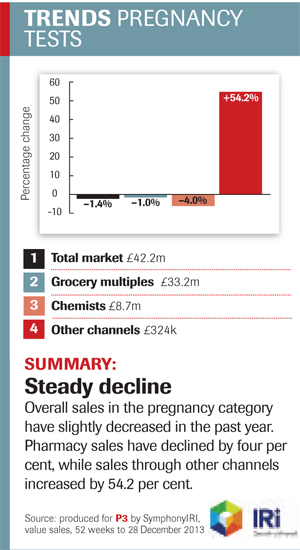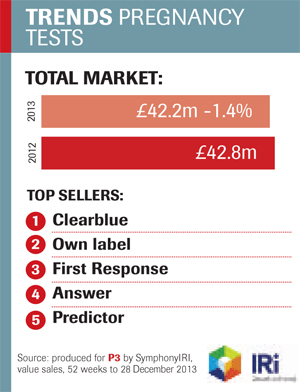OTC

A healthy nine months
In OTC
Bookmark
Record learning outcomes
Mums-to-be need reliable advice and reassurance during pregnancy, a role that pharmacy teams can help to fulfil
Last year there were almost 700,000 babies born in the UK, the highest number for over four decades. The UK is now the third most populated state in the EU after Germany and France.
However, the chronic shortage of NHS midwives looks set to continue until the mid-2020s, despite ministerial pledges to improve maternity provision. Coupled with the shortage in numbers, midwives in the UK are being faced with further complications in their jobs: between 2001 and 2012 there was an 85 per cent rise in babies born to women in England aged 40-44. Births to older women often require more care from midwives and this trend looks set to continue.
This means that midwives will have increased caseloads and their time will be even more limited, particularly for women regarded as low- risk. Is pregnancy an area where other healthcare professionals, including pharmacy staff, could take on a wider role?
Support through pregnancy
Pharmacy teams could play a wider role in supporting mums-to-be, believes director of  marketing at Numark, Lynne Armstrong. ‘Offering advice to mums-to-be should start pre- pregnancy – this builds customer confidence and trust that you will look after baby as well as mum. New mums-to-be are generally those in most need of advice and while midwives will primarily be the first port of call, getting information can be delayed due to workloads, whereas pharmacists are more easily accessible. The right information and support pre- conception and throughout the pregnancy probably means you will have a customer once the baby is born too.’
marketing at Numark, Lynne Armstrong. ‘Offering advice to mums-to-be should start pre- pregnancy – this builds customer confidence and trust that you will look after baby as well as mum. New mums-to-be are generally those in most need of advice and while midwives will primarily be the first port of call, getting information can be delayed due to workloads, whereas pharmacists are more easily accessible. The right information and support pre- conception and throughout the pregnancy probably means you will have a customer once the baby is born too.’
Michelle Myers at Numark member Marton Pharmacy in Stockton-on-Tees offers lots of support for mums-to-be. ‘Time with the midwife is very limited, so we can offer women a drop-in service to share their concerns and get advice. We have healthy living advisors as well as pharmacists.’
At Rowlands Pharmacy group, clinical development pharmacist Leah Davies says that by ensuring staff have up-to-date knowledge and are aware of the specific needs of pregnant women, they can provide welcome support throughout pregnancy. ‘This can include providing advice on healthy lifestyles, information on how to deal with pre-existing conditions, treatment and advice for minor ailments, raising awareness of the importance of vaccinations and providing general education. Women have the opportunity to discuss any of their concerns in a confidential, non-threatening environment.’ While advice is tailored to the needs of each patient, there are specific topics that come up frequently. ‘We can advise on dietary choices, activity levels and smoking cessation. We can also include tips on dealing with common problems such as swollen ankles,’ says Ms Davies.
At the Royal College of Midwives, public policy midwife Janet Fyle says there are certain areas where pharmacists could play a supportive role during pregnancy, but this relies on them being properly trained and with up-to-date knowledge. ‘Reducing diabetes risk and cutting other pre- conception risks are definitely areas where pharmacists could play a wider role. However, they need to form links with the wider health professional community in order to do this well, including dieticians, midwives and community nurses. The potential is there for pharmacists to become a much more important healthcare advisor for pregnant women.’
Smoking cessation support
Women will be under pressure to give up smoking during pregnancy and this is one area where pharmacists have recognised expertise.
‘We run a stop smoking clinic for pregnant women. It’s often hard for them to quit and they’re under a lot of pressure to do so, therefore it needs sensitive handling. We are given extra training to do this – we aim to give them motivation, not a lecture,’ says Ms Myers.
At Rowlands Pharmacy they offer smoking cessation advice using NRT in pregnancy. ‘While quitting without NRT is the ideal option for a large number of pregnant women, this is unlikely to be possible. I would generally advise using an intermittent form of NRT such as gum isn’t safe to take, and pharmacists can offer women invaluable advice,’ says Ms Myers. Ms Davies agrees: ‘I see a lot of women who have concerns about taking medicines, and while they know they can’t take a specific medication they don’t know what they may take instead.’
Ante and post-natal depression
One in 10 women is affected by mental illness either during pregnancy or post-natally, says the RCM. This includes anxiety, panic disorder, depression, bipolar disorder, postpartum psychosis and post-traumatic stress disorder. Only 27 per cent of maternity services have a dedicated specialist mental health midwife.
‘Pharmacists are in a good position to spot possible mental health problems and talk to women confidentially about their concerns. Many women may be reluctant initially at telling their midwife or GP as they may be frightened the baby could be taken from them, but they might be happy to talk to their local pharmacist. You can then refer them to the right service for help,’ says Ms Fyle.
Vaccinations in pregnancy
Last winter pregnant women were advised to have the whooping cough vaccination during pregnancy as the number of cases in newborns was exceptionally high. Women are also advised to have the flu vaccine during pregnancy to protect both themselves and their babies. ‘If you’re going to give advice on vaccines in pregnancy, this must be up to date. There is no reason why community pharmacists can’t give flu vaccines to pregnant women, and it makes sense for them to do so. But they need to strengthen relations with midwives and nurses for it to work well,’ says Ms Fyle.
Build the category
Here’s how you can build and maintain a successful category for mums-to-be:
 ‘Advertise the services you offer pregnant women in-store and offer a consultation room if they would prefer a private discussion,’ says Ms Myers.
‘Advertise the services you offer pregnant women in-store and offer a consultation room if they would prefer a private discussion,’ says Ms Myers.- If you can, have therapists on-hand who can offer pregnant women therapies such as reflexology, massage or someone they can discuss skin concerns with as that’s a common issue,’ says Ms Myers.
- Be able to offer women self-help advice. ‘Give tips on self-care measures to help with minor ailments,’ says Ms Davies.
- Know which areas pregnant women need advice on and stock remedies accordingly. ‘Indigestion is a common complaint in pregnancy and patients often request remedies and advice on how to minimise symptoms,’ says Ms Davies.
- Spatone and Nelsons Baby brand manager Ngaire Mitchell says: ‘Make sure your category includes a range of different products to help with a variety of pregnancy conditions, but don’t make the selection too big as this is confusing. Dual site products such as iron supplements and haemorrhoid cream in the pregnancy fixture as well as VMS and topical creams. Include point of sale materials where possible to explain how products can help in pregnancy.’
Brand activity
Bio-Oil is introducing the Bio-Oil Bump Tracker app in February. The free app allows mums-to- be to take aligned photos of their growing bump each week and at the end of their pregnancy they will have a time-lapse video tracking their changing shape. It also  gives advice on preventing stretch marks. A new website has also been developed for mums-to-be. The company has developed Bio-Oil Tutor programmes to arm pharmacists with knowledge to advise women on stretch mark concerns – see www.bio- oilprofessional.com.
gives advice on preventing stretch marks. A new website has also been developed for mums-to-be. The company has developed Bio-Oil Tutor programmes to arm pharmacists with knowledge to advise women on stretch mark concerns – see www.bio- oilprofessional.com.
Spatone continues to be a key driver in supplements, says the brand, with a reported value growth of five per cent compared to a category growth of seven per cent. The brand also claims a majority share of the total UK category (51 per cent), which it says has been down to the launch of Spatone Apple, an apple flavoured version of the product with vitamin C.
Practising midwife, Maggie Evans says: ‘I believe that due to Spatone’s lack of side effects, women are more likely to comply with taking this supplement long-term.’
Nasal cleansing brand Stérimar is introducing new packaging across its range this month. Also this year it will launch a campaign to help pharmacists grow their business. The campaign will consist of print advertising, online training, in-store communications and face-to-face briefings with sales teams. The brand’s 100 per cent natural nasal cleansing products used to relieve a blocked nose from a cold or flu are safe to use while breast feeding and during pregnancy.
Comment
 Fiona McElrea, Whithorn Pharmacy, Whithorn ‘Advice for pregnant women ranges from morning sickness to what medicines they can take. This category makes us no money (the Health Board controls the price we sell Healthy Start products at), but new mums are vital customers and we aim to look after them from the start. Some women buy folic acid and those on a low income are entitled to Healthy Start vitamins. Many people are eligible for minor ailments, so try the products on the formulary (at no cost to them) before thinking about buying them. They start with a minor ailment script, and if there’s no success they visit their GP and access products through the NHS. This has had an effect on our retail sales, but it does increase minor ailments numbers.’
Fiona McElrea, Whithorn Pharmacy, Whithorn ‘Advice for pregnant women ranges from morning sickness to what medicines they can take. This category makes us no money (the Health Board controls the price we sell Healthy Start products at), but new mums are vital customers and we aim to look after them from the start. Some women buy folic acid and those on a low income are entitled to Healthy Start vitamins. Many people are eligible for minor ailments, so try the products on the formulary (at no cost to them) before thinking about buying them. They start with a minor ailment script, and if there’s no success they visit their GP and access products through the NHS. This has had an effect on our retail sales, but it does increase minor ailments numbers.’
Â
 Ani Patel, Savages Pharmacy, Burnham on Crouch ‘It is important to make customers aware of what they can take or use during pregnancy. We aim to provide as much information as possible and leave the customer to choose the product that is safe for them. The major brands are advertised well and stand out. We tend not to offer cheaper alternatives, as customers usually ask for branded products. The promotion of healthy pregnancies and lifestyles is a way to improve sales – one cannot be achieved without the other. We maintain a range of products within this category, including supplements, personal care products, skincare, GSL and other medicines. They are located in prominent areas to show the importance of making good choices.Â
Ani Patel, Savages Pharmacy, Burnham on Crouch ‘It is important to make customers aware of what they can take or use during pregnancy. We aim to provide as much information as possible and leave the customer to choose the product that is safe for them. The major brands are advertised well and stand out. We tend not to offer cheaper alternatives, as customers usually ask for branded products. The promotion of healthy pregnancies and lifestyles is a way to improve sales – one cannot be achieved without the other. We maintain a range of products within this category, including supplements, personal care products, skincare, GSL and other medicines. They are located in prominent areas to show the importance of making good choices.Â
Â
 William Hughes, RJ Jones Pharmacy, Nefyn ‘Pregnancy is a low volume, but high interest category. While there aren’t many women coming into purchase a pregnancy test, when they do, they may want and need quite intensive support. However, it takes the skills of an experienced counter assistant to realise that you shouldn’t always intervene, as some customers just want to purchase the test discreetly and leave. As health professionals we are in an ideal position to intervene at the very start of the pregnancy. It also means that you can build a very loyal customer base throughout the pregnancy and after the child is born. Pregnancy links in with lots of the big public health issues from healthy eating to keeping fit and not smoking.’
William Hughes, RJ Jones Pharmacy, Nefyn ‘Pregnancy is a low volume, but high interest category. While there aren’t many women coming into purchase a pregnancy test, when they do, they may want and need quite intensive support. However, it takes the skills of an experienced counter assistant to realise that you shouldn’t always intervene, as some customers just want to purchase the test discreetly and leave. As health professionals we are in an ideal position to intervene at the very start of the pregnancy. It also means that you can build a very loyal customer base throughout the pregnancy and after the child is born. Pregnancy links in with lots of the big public health issues from healthy eating to keeping fit and not smoking.’
Â
